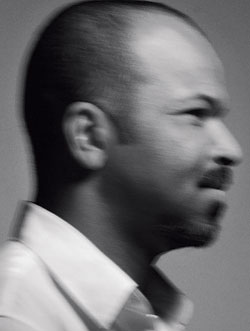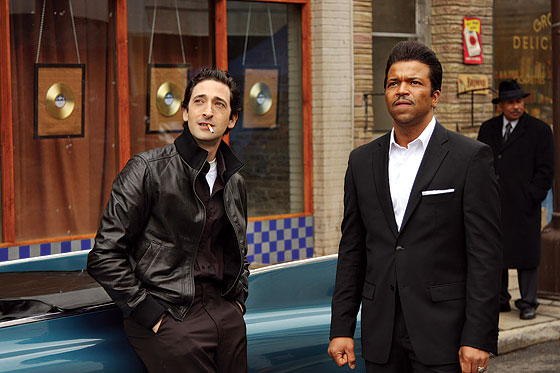
It’s been a transformative year in a lot of ways,” says Jeffrey Wright, leaning into a small masterpiece of deadpan understatement. “The schedule has been pretty tight, and I certainly spent one more night in Shreveport, Louisiana, than I would have liked.”
In fact, the actor has zigged and zagged from the fall’s most audacious film, Oliver Stone’s W., to the season’s biggest blockbuster, Quantum of Solace—and all over the country (Florida, New Hampshire, Virginia, and Colorado) as a leading celebrity emissary for Barack Obama’s presidential campaign. In a few minutes, he’ll get around to talking about the Shreveport incident that sent him to a Louisiana jailhouse in handcuffs this summer. But right now, just a few days after the election, and a few weeks before the December 5 premiere of Cadillac Records—in which Wright plays bluesman Muddy Waters—the actor is settled in an armchair, quietly marveling in his deep, thoughtful baritone at how fast things can change, whether it’s the birth of rock and roll or a new kind of politics.
“I remember we threw a fund-raiser for Obama’s Senate campaign in Central Park four years ago,” Wright recalls. “We struggled to get 50 people to attend that thing. I had faith in him, but it’d be a bald-faced lie to say I thought it was going to happen in four years. It’s mind-blowing.”
Wright talks about walking into his Brooklyn polling office earlier this month, “with my son’s hand in mine and my daughter in my arm, with a picture of my grandparents in my pocket … I was born in the sixties, and I always had a fugitive relationship to political power,” adds Wright, now 42. “So this has been a rearrangement of my political universe.”
Wright’s relationship with politics, fugitive though it may have been, goes back to the beginning. He grew up in Washington, D.C., with a mother who worked for the government. He studied political science in college before cutting his teeth at the Public Theater. There, he made his name in the most charged theatrical production of the last half-century, as Roy Cohn’s transsexual nurse in Tony Kushner’s Angels in America. His film roles have included Jean-Michel Basquiat (in his film breakthrough, Basquiat); Martin Luther King Jr. (Boycott); photographer Howard Bingham, friend of Muhammad Ali (Ali); and his careful, conflicted Colin Powell in W. Wright, a precise and logical conversationalist, doesn’t just vaguely sympathize with the former secretary of State. He frames Powell as a squandered asset. “You know, when an F-16 crashes and a pilot is killed, you always hear about the cost of the training of the pilot and what a great loss it is,” he says. “Powell was a weapon that was developed over half a century, and millions of taxpayer dollars went into the formation of his abilities and his capacity. Then that investment was wasted. Just the capital costs—that’s reckless beyond measure.”
Biopics often get a bad rap, but Wright defends his proclivity for them as part of his special talent for exposing “what we haven’t seen”—men like his grandfather who were marginalized by this country. “My grandfather, he grew up in rural Virginia,” says Wright. “He was a waterman on the Chesapeake Bay and farmed a few acres of land—was gone before the sun came up and didn’t stop working till after it’d gone down. Worked his ass off, for 88 years. But I never got the sense, from the mainstream perspective, that his was the all-American story.”
Playing a Waters or a Basquiat is a small way of finally placing such men at the center of the culture. “They were devalued when they were living and there’s a devaluation of them now, which film and telling their stories can help begin to right.” But not, he’s quick to point out, as a way to sanctify them: Wright argued with Basquiat director Julian Schnabel over making the painter “more dangerous,” and Waters isn’t exactly a model of moral purity. “It’s sex, booze, and the blues, you know?”
Cadillac Records, directed by Darnell Martin, follows Muddy Waters up from the dirt fields of Mississippi to the dirty streets of Chicago, where he connects with label-owner Leonard Chess of Chess Records, and then Etta James (Beyoncé) and Chuck Berry (Mos Def). His Muddy is an unabashedly erotic “Hoochie Coochie Man” onstage, an immovable object off. To prepare for the part, Wright says he played Waters’s music so incessantly “my kids became raging Muddy fans.”
“Jeffrey really listens, in general, and the key to great acting is always listening,” says Adrien Brody, who plays Chess. “Especially when you’re playing a musician. I think Jeffrey and I are both drawn to music because it’s such an emotional form of communication.”

Wright has always been more inspired by musicians than fellow actors—and few more than the bluesmen who redefined American music. “It there’s one grounding principal for me, it’s to try to avoid the cliché,” he says. “If there’s a challenge to acting, it’s trying to do something that emulates what these original bluesmen did: craft something out of nothing. What I’ve been led to understand is that there is no rock and roll, there’s only the blues. Rock and roll was just a marketing term to entice young white kids.”
If there’s one thing that connects everything Wright has been through this year, from Obama to his film work, it’s a sense of the inescapability of history, and the sometimes wrenching violence and lurching pace of change. On July 12, on location in Shreveport for the W. shoot, Wright, Josh Brolin, and others were arrested at a local bar—and there have been reports of excessive police force. Because of a December 2 court date for the case, which is still pending, Wright is reluctant to discuss details.
“It wouldn’t be wise of me to talk about it now,” he says, “but I will say I thought of Obama after it happened, as I was trying to think about why the hell we’d been placed in that position. I recalled how he displays this talent for converting liability into asset. And my hope is that I can do the same with this incident.”
The focus of his response will not be himself, he adds, but the more systemic problems in Louisiana. “There are large numbers of people better than me, who’ve been hurt far worse in similar incidents down there,” says Wright. “So perhaps we can deflect some of the disproportionate attention that’s been shined on us positively toward them.
“I’m trying to craft it into a positive experience … with great difficulty.”